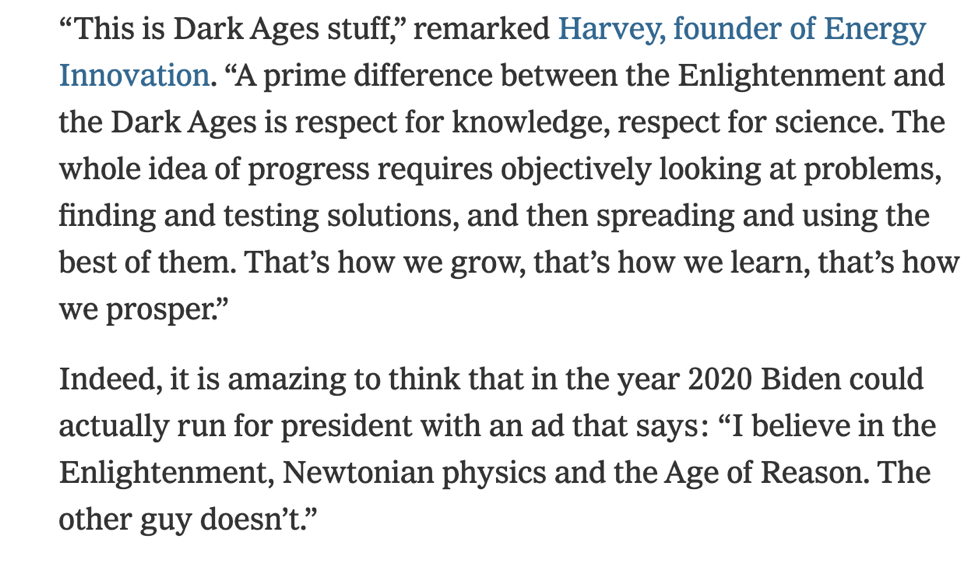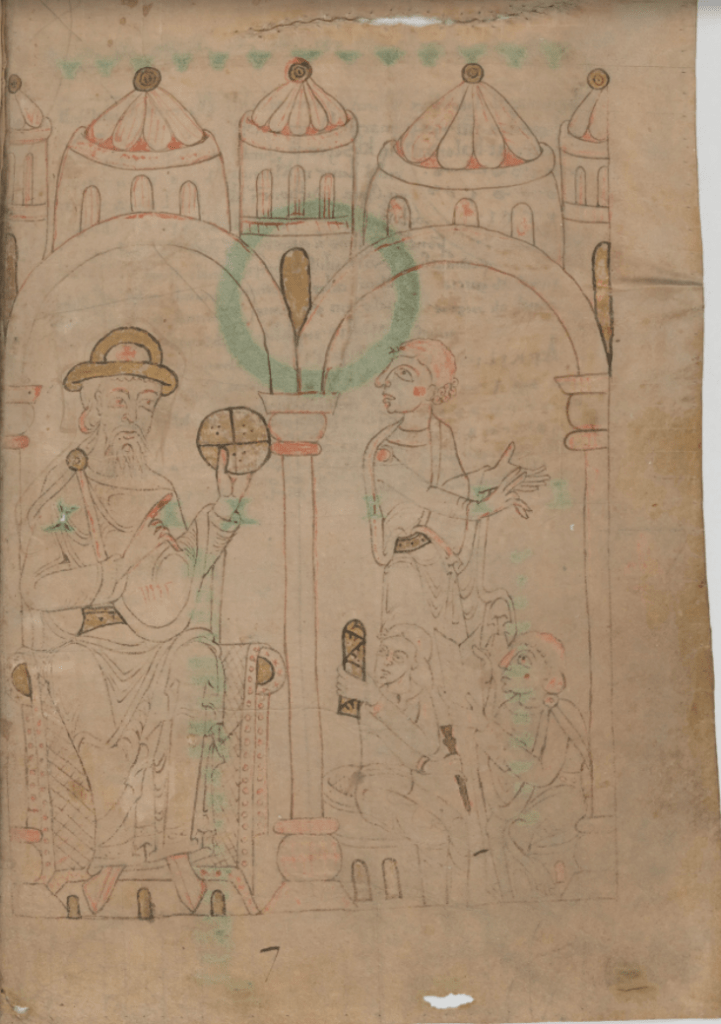Because I am absolutely responsible for all of my own problems, my lovely readers often send me bad medieval takes in order to watch me get mad. This is effective. Today, one of my fantastic Patreon patrons did so by sending me this truly terrible take in the New York Times. Yeah you think it is going to be an innocuous take about messaging in the American presidential election because Thomas L. Friedman is chirpily writing about what “Should be Biden’s Bumper Sticker”, but then, well…

To be fair to Friedman, who wrote the piece, the terrible take in question is actually that of Hal Harvey, the CEO of the somewhat ominously named Energy Innovation Policy and Technology LLC. However, Friedman is the one who thought it was a good take and quoted it in the paper of record (snort) so he is also culpable.
Now, I know that you know that this is not what the Dark Ages means, because you have all already read my piece about how it’s a reference to a lack of sources rather than an intellectual decline. Right? Right. If not we can just wait here until you get back. Done? OK good.
What I want to talk about today is how the thing that many STEM bros mock the early medieval period for – a refusal to “respect knowledge” – is actually what they are doing every time the offer up this particular “argument”.
No to be fair to Harvey and Friedman, the fact that they think that this is some fire-ass take is proof that they are just completely ignorant about what the terminology they are using even means. I am inferring from Harvey’s statement that he sees the Dark Ages as something which stands in opposition to the enlightenment and happened before it, because history is one straight march towards progress. In other words, he thinks that “Dark Ages” and “Middle Ages” are interchangeable terms, which, bless. That is not the case, of course, and we used to use the term Dark Ages just to refer to the early medieval period before the term was ruined by a bunch of dudes who wanted to dry jack about how clever they are.
More than that, this periodization seems to indicate that Harvey here thinks that the “Dark Ages” lasted until the enlightenment. Ordinarily I would expect dudes like this to say something ignorant about the Renaissance and the Enlightenment, but no. He is going full on “Everything was bad until Isaac Newton discovered physics” and it is both intensely wrong, and so self-indulgently ignorant that it is staggering.
Just based on terminology, it is clear that these two are spouting off about something that they have absolutely no frame of reference for, while mocking the people of that era for “rejecting” knowledge. Harvey and Friendman are more than welcome to crack exactly one (1) book on the medieval period generally, or medieval science and knowledge more specifically, in order to disabuse themselves of the idea that there was an over one thousand year period when everyone was just really stupid, unlike them, but instead they are doing this. Hell, why not just like, google it and read this very good blog article from the British Library before running your mouth. The information on scientific knowledge in the medieval period is so incredibly readily available, that I would argue that choosing to ignore a complex historiography and a millennium of history in order to try to make myself feel better about my own intellect would be “rejecting” knowledge. But hey, who needs inquisitiveness when arguing for Science?

As I have pointed out, repeatedly, there was never a point – in the early medieval period or the medieval period writ large – when presented with a piece of knowledge that medieval Europeans said, “No I am sorry I reject that”. Especially when it comes to so-called Scientific thought. People were absolutely chomping at the bit to get their hands on, say, the latest treatises on eye surgery from the Arabic speaking world. Sometimes it took a long time, but the minute the scriprotia of the Iberian peninsula translated the works to Latin they were circulating in huge numbers. People were always interested in learning more.
Now you may have noticed part of why their belief in the conception of the “Dark Ages” is, shall we say, problematic in the paragraph above. Yes that is correct, it is because as I have written before, and this is crucial, white people were not the only people alive in the medieval period. Even if we gave in to the ahistorical idea that everyone in Europe falling the collapse of Rome simply decided that they hated Science, there would still be this thing called “the-rest-of-the-world” where that was not the case. Check in with China who were arguably more technologically advanced than the Romans and who were still massively innovating throughout the European Middle Ages and tell them how they were rejecting knowledge. Go talk trash about Avicenna’s medical advancement, smart dudes who are so clever they think that only one continent ever existed. Saying that the Dark Ages was a time when knowledge was rejected is just saying that you think that technological advancement only counts when white people do it.
So yeah, this take about the scary Dark Ages is both wrong and pretty racist, which is a big part of the reason why we often ignore the medieval period, as I have pointed out before. But it is also something else which belies their claim to intellectual rejection of anything other than imperial fact – it’s a belief. In order to hold this idea you have to actively avoid any knowledge of the medieval period, instead upholding the incredibly biased posturing of “the Enlightenment … and the Age of Reason”. Funny thing about both of those terms, they were explicitly invented by the people involved in order to self-aggrandise. So yeah, your Very Smart dudes here have just taken Voltaire’s word for it that the medieval period was bad and stupid and just … never looked into it again. So much for the vaunted Scientific approach of, you know, actually confirming that a hypothesis is accurate.
The Scientific advancements of the seventeenth-century and beyond were not something that occurred because an apple fell on Newton’s head. They were a part of a long tradition of scientific thought and inquiry that people just haven’t bothered learning about because the history is too complex for smug think tank guys to wrap their heads around in five minutes between power lunches. If you asked Newton, who Harvey is out here stanning without even a hint of irony, he would be the first to tell you that his findings were possible because he was “standing on the shoulders of giants”[1], a phrase which in and of itself is a nod to the twelfth-century neo-Platonist philosopher Bernard of Chartres.[2]

You cannot claim to be a proponent for knowledge whilst simultaneously using an inaccurate historical belief to attempt to score points against your political opponents. You are either about the intellectual life, which would force you to stop parroting inaccurate myths, or you are a part of the same anti-intellectualism which you are attempting to deride.
These things matter. I have written before about why the misuse of the word medieval – something which Trump himself indulges in! – is bad, but it bears repeating. Our society is responsible for its own problems. Early medieval people didn’t have access to a bunch of “correct” Science and then choose to start ignoring it. (I will never ever understand what it is these people think the Romans had going for them, honestly.) We are doing that now. If you offered medieval people a bunch of, say, workable medicine and explained why it works, they would probably thank you and immediately begin administering it free of charge to anyone who needed it. The people who are currently either a) denying people healthcare because of financial barriers, or b) ignoring the science behind a pandemic because it impinges on their “freedom” are thoroughly modern Americans.

Moreover, medieval Europeans were absolutely committed to maintaining communal health, whether through sensible (and at times perhaps too harsh) social distancing, as we can see in the medieval treatment of lepers. Lepers were often forced to live in communities called Lazar houses or leper colonies, where they would be kept away from the general population to avoid contagion. This is not to say that they were entirely apart from the societies that they lived in. Lazar houses were often located near bridges or city entrances in order to attract alms to the community and highlight the benevolence of the people who had endowed them. Lepers also often carried bells or clappers to let people know they were begging for alms on the few specific days a year that they were allowed into cities to beg. In other words, medieval people were acutely aware of the necessity for providing for people suffering from an illness and also of keeping the general population separated from them.
Medieval Europeans were absolutely committed to communal welfare, but even if they were not, they didn’t even have a conception of the personal rights that could be infringed upon that would encourage them to endanger their community because the concept was not yet invented. In fact, it is arguable that without the Enlightenment conception of the rights of man your weird uncle would never even have got the idea that he had a right to endanger his life and those of others in order to go to Buffalo Wild Wings without a mask. Americans are doing this right now because the conditions of American society have allowed for it and because of the enduring legacy of Enlightenment thought.
In other words, these are modern problems, and we do not solve them through attempting to demonise everyone who was alive in the medieval period. Doing so is not only factually incorrect, but it takes away from an argument for intellectual advancement. You can’t call other people ignorant while being ignorant yourself. Put that on a bumper sticker.
[1] Newton in a letter to Robert Hook, 1675, available at <https://digitallibrary.hsp.org/index.php/Detail/objects/9792>, Accessed 2 July 2020.
[2] MacGarry, Daniel Doyle, ed., The Metalogicon of John Salisbury: A Twelfth-century Defense of the Verbal and Logical Arts of the Trivium. Translated by MacGarry, Daniel Doyle. (Berkeley: University of California Press,)p. 167.
If you enjoyed this, please consider contributing to my patreon. If not, that is chill too!
For more on myths about the medieval period, see:
Plague Police roundup, or, I am tired, and you people give me no peace
How to win friends and influence people in medieval Europe on History Hit
JFC, calm down about the medieval Church
On Medical Milestones, Being Racist, and Textbooks, Part I
On Medical Milestones, The Myth of Progress and Being Racist, Part II
On medieval healthcare and American barbarism
I assure you, medieval people bathed.
On colonialism, imperialism, and ignoring medieval history
“I wasn’t taught medieval history so it is not important” is not a real argument, but ok
There’s no such thing as the ‘Dark Ages’, but OK
On the Concept of the Renaissance and Outkast’s Hey Ya
FUCK YEAH Genghis Khan – an emergency pubcast
On why the misuse of the word ‘medieval’ is a bad thing


Most excellent!
LikeLike
Some of my favourite things all in one place: a solid understanding that the past (particularly pre-Early Modern) wasn’t just some homogenous glob of culture, along with rapier wit and stellar writing.
LikeLiked by 1 person
Laura you are a sweetie. So glad you enjoyed it.
LikeLiked by 1 person
And witch burnings and pogroms!
Huzzah!
LikeLike
This is beautiful
LikeLiked by 1 person
You hit the nail on the head as usual. I’ll add that, if anything, it’s modern people who often misunderstand science and display magical thinking. It’s especially noticeable when trained medical professionals do it, but usually it’s a trait of science enthusiasts whose understanding stops at “ooh, cool photos of test tube racks in this popular science magazine!” And that endangers us all, because we think we understand.
LikeLiked by 1 person
Do we dare hope that understanding of History such as this becomes widespread.
Our national conversation consists of leftist who cannot imagine that anything before they were born is good or meaningful answered by “conservatives” who can go back two hundred years or so. Deep.
There are vast imaginary histories promoted that pale compared to the actual facts.
The presumed ignorance of the “Dark Ages” is nothing to the willful idiocy of our times.
LikeLike
Tell me of these “leftist” (best to use good grammar when slamming nameless “others” for their alleged ignorance, BTW) ruining our “national conversation” (WTF?) you speak of, because I have never, ever met one.
What embarrassing pomposity!
LikeLike
Friedman is everything I despise the NYT for, in an asshole. If TF thinks well of something, I reevaluate that to see why I agree with him – and it always turns out that I do not, because his support is based purely on arrogant, smug, racist, tool-of-the wealthy horseshit.
When I hear he is dead, I hope to happen to be already in the neighborhood, with time to kill.
LikeLike
What, you mean the guy who slobbered over the first Iraq War STILL hasn’t learned jack shit about history? Shocking. One might call him a walking dark age.
LikeLike